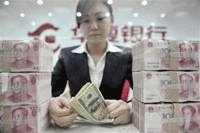
China 'moving to more convertible yuan'
Beijing, January 1, 2012
China's central bank governor argued in comments published that Beijing does not control the yuan's flow across borders as tightly as some think and that it is natural for the currency's trading band to be widened over time.
Zhou Xiaochuan said in an interview with Chinese magazine Caixin that China did not fare badly on an International Monetary Fund measure of currencies' convertibility under the capital account. But he stopped short of calling for a fully convertible currency.
"If the highest standard of measurement is to have wholly unrestricted convertibility, then so many developed countries have not achieved 100 percent full convertibility," Zhou said.
Investors increasingly expect that China will give them more freedom to trade the tightly controlled yuan.
While the currency is already convertible under China's current account, the broadest measure of trade in goods and services, the capital account, which measures inflows and outflows of different types of capital, is still closely managed by Beijing as it worries about capital flight and hot money inflows.
Countries with convertible currencies under their capital account let their currencies trade with few restrictions for investment purposes.
Zhou noted China must regulate levels of foreign debt incurred by private and public sectors to reduce currency risks, monitor cross-border deals to guard against illegal activities such as money laundering, and combat speculative capital flows.
"Excluding the above three factors and judging from the 40 sub-items set by the IMF, you may find that actually China is not that far from capital account convertibility," Zhou said.
Still, he said Beijing would keep improving the exchange rate regime to make it more flexible, adding it is natural for the currency to fluctuate in a bigger trading band in future.
China currently lets the yuan trade in a 0.5 per cent range, and moves to increase that band would show Beijing is gradually relaxing its control over the currency. "Compared with international markets, you may know that the 0.5pc (daily trading band) is quite a small floating band," Zhou said.
Investors had speculated earlier this year when China was fighting three-year high inflation that Beijing would widen the yuan's trading band to accelerate its rise and combat price ressures.
Instead, Beijing raised interest rates three times, moves that have produced some tentative success: Inflation eased to 4.2 per cent in November, down from a 6.5 per cent high in July.
Zhou acknowledged that price pressures are easing and that the job of fighting inflation is not as urgent as before. But he warned against complacency.







